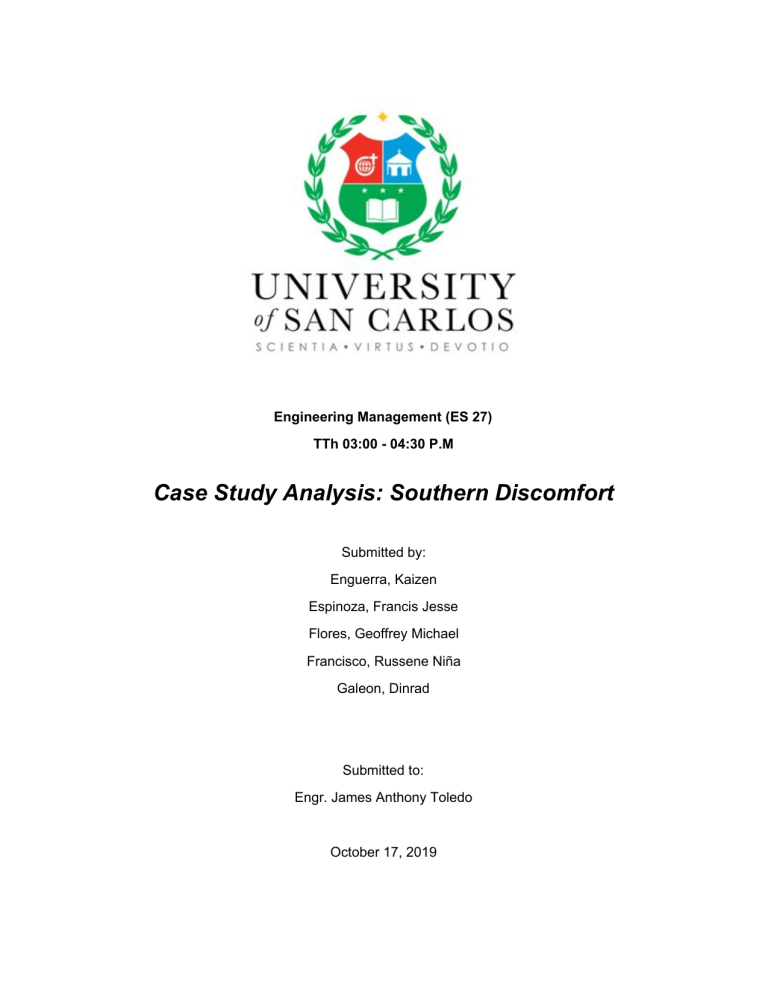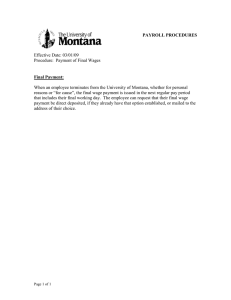
Engineering Management (ES 27) TTh 03:00 - 04:30 P.M Case Study Analysis: Southern Discomfort Submitted by: Enguerra, Kaizen Espinoza, Francis Jesse Flores, Geoffrey Michael Francisco, Russene Niña Galeon, Dinrad Submitted to: Engr. James Anthony Toledo October 17, 2019 I. B ackground The Oconomo plant is on the verge of closing down due to high costs. Jim Malesckowski, president of the Wisconsin Specialty Products Division of Lamprey, is tasked to make a report on the operational costs within the week to move the plant to Mexico, which would save them around $15 million a year due to lower wages, $1.60 per hour as opposed to $16 per hour and at the cost of poor facilities. There were 520 people at the plant and should it close, they would have slim chances of finding another job in a town of 9000 people. Since the plant was unionized, Jim had to talk with the union leaders to negotiate lower wages which was met with resistance, even though the leaders’ fear began to surface. The proposal of a cell manufacturing approach which cross-trains employees for up to 3 different jobs was also futile. As the report is submitted, it was evident that the Oconomo plant was struggling to net profit. Jim would be discussing the report to the CEO. He personally does not want the plant to be dismantled and believes that the plant could be saved as there is still a chance on having the costs lowered but due to the high costs and the unwillingness of the union to cooperate, he is pitted in a difficult situation. II. Statement of the Problem The Oconomo plants existence has become financially difficult to justify, due to high costs and pressure from competitors, they have been experiencing a conflict in organizing. The CEO wishes to move the plant to Mexico for cheaper costs at the expense of the loss of the jobs of the workers there and historical significance of the plant which has been running since 1921. Negotiations with union leaders to have the plant workers’ wages lowered were unfruitful and due to the need of the company to gain better returns in their investment, the dilemma to move the plant ensues. III. Alternatives 1. Call out the union leaders’ bluff. Since the leaders are uncooperative with wage negotiations, the plan to relocate the plant to Mexico should be placed into motion. Best case scenario would be that the leaders will accept the wage reduction in order for the workers to keep their jobs, worst case would be that the company will move to Mexico and continue operations there with lower costs. Either way the company would not be facing total loss and thus ensures a zero sum game situation. 2. Discuss with the CEO and the union leaders about the significant benefits and losses of their company’s situation. Convince the people to be open to new ideas and suggestions, and implement them with full appropriate cooperation from employees and leaders. 3. Hire a Consultant that would study and assess the entire company, consultants that can provide an unbiased eye and do some of the dirty work. The report will be backed up with facts and figures that will support their recommendations for possible major restructurings that will be for the greater interest of the company. 4. Call in the union leaders and urge them to reconsider by laying down the facts: that if they would not at the very least agree to a compromise, the plant would have to be shut down and production would have to be moved to Mexico, resulting in the loss of all the employees’ jobs in the area. Easing the union’s resistance would be the first step to alleviating the problem at hand. IV. Conclusion It’s impossible to make this situation instantly work with both sides being happy. Undoubtedly, one side will suffer loss and will need to suck it up, and that side would obviously be on the union’s side, because the CEO and investors would never permit themselves to endure losses in their business. To fix this problem where they can offer the average and acceptable to wage to their workers and have a manageable operating costs, they would either need to cut down those operating costs by making the plant more cost efficient or rake in more earnings or profits. From there, Jim needs would need to have more critical-thinking analysis to weed out the problems, inefficiency and obsolescence of the plant, which is causing this situation of high-operating cost. Jim can also try to think of ways, instead of just focusing on making special apparel for people suffering with injuries and other medical conditions, to expand/restructure the business in a new perspective, and increase the sales/profit. Either way, both those paths are in no way short-term, thus Jim would need to prepare himself all through that time frame, where he has to constantly face the CEOs and investors for the continued support for his proposal, and the union leaders to be convinced that their working environment will be returned to their comfortable state. V. Recommendations The recommended course of action is alternative #4. In order to make this situation better, Jim should resolve himself to fundamentally change the structure of this business, which would need a lot of time and effort. First, he has to talk it out with the union leaders to accept the lowered wage by emphasizing the gravity of the situation where they will lose the plant which their fathers and their grandfathers have worked on, and also along with it, their jobs. He will need to persuade them to work and endure this loss for a while so at the same time, he can plan out some changes to the business and return it to the acceptable and comfortable working environment they are used to. Reorganization of the plant’s production process is the next step. After the union leaders are satisfied and are willing to make changes, they can start looking at the competition. Considering the competition is almost there in terms of production quality while beating them out in price, analyzing their products and how they are made will provide valuable info on how their production could be improved to be more efficient.

